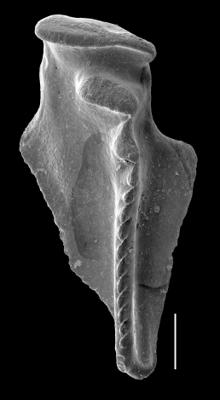Kaljoprion laevaensis Hints, 2008

Hints, O., 2008a
Diagnosis. As for the genus.
Description. Asymmetrical jaw apparatus of labidognath type consisting of paired MI and MII; basal plate most likely present, other jaws unknown.
Left MI: L = 0.22-0.68 mm, L/W = 1.8-2.4 (holotype: L = 0.65 mm, L/W = 2.0). Outer face subtriangular, its maximum lateral extension located at about 0.3-0.4 of jaw length from anterior. Postero-lateral margin nearly straight or slightly sinusoidal, meeting the ridge before the posterior termination. Inner wing subtriangular, tapering posteriorly, occupying up to one-third of jaw width and reaching to about two-thirds of jaw length from posterior. Posterior margin narrow, convex, placed to the right of the ridge. Dentary composed of two transversal ridges in the anterior part, followed by one large, sometimes transversally slightly widened denticle and 7-11 small nearly equal-sized denticles. Transversal ridges slightly slanting postero-medially; the first ridge corresponds to about 0.75 of jaw width, the second one is half as long as the first. In ventral view, cover extends to about 0.1 of jaw length. In juvenile specimens the first transversal ridge is composed of three separate transversally widened denticles, the length of the second ridge forms about one-third of the first ridge.
Right MI: L = 0.31-0.74 mm, L/W = 1.8-2.6. Outer margin directed postero-laterally at anterior 0.3-0.4 of jaw length, then bending steeply and running postero-medially towards the tip of ramus. Ramus extends to 0.5-0.6 of jaw length. Shank is slender, tapering posteriorly. Dentary similar to that in left MI, with two long transversal ridges in anterior part. The first ridge corresponds to 0.7-0.85 of jaw width, the second ridge to 0.5-0.6 of jaw width. The following denticle is larger than others, transversally slightly widened or rounded and blunt. Remaining part of dentary composed of 8-10 normal denticles decreasing in size posteriorly. In ventral view, myocoele very slightly enclosed, cover extending to 0.1 of jaw length or less. In juvenile specimens a separate denticle is present in lateral portion of the first transversal ridge and occasionally in the second transversal ridge.
Left MII: L = 0.13-0.22 mm, L/W = 0.65-0.8. Sub-rectangular jaw, wider than long, with wide and straight anterior margin. Ramus is more slender and slightly longer than shank, bight is widely rounded. Anterior part of jaw has long transversal ridge similar to those in MI, corresponding to 0.75 or more of jaw width. Shank has 6-11 small equal-sized denticles; sometimes the denticles are indistinct.
Right MII: L = 0.17-0.23 mm, L/W = 0.7-1.0. Jaw is almost mirror reflection of right MII.
| Organism group | Biota |
| Kingdom | Animalia |
| Phylum | Annelida |
| Class | Polychaeta |
| Order | Eunicida |
| Family | Incertae Familiae |
| Genus | Kaljoprion |
| Species | laevaensis |
- Hints, O., 2008a Laeva 18 borehole 224 - 226.8 Nabala Stage
- Hints, O., 2000